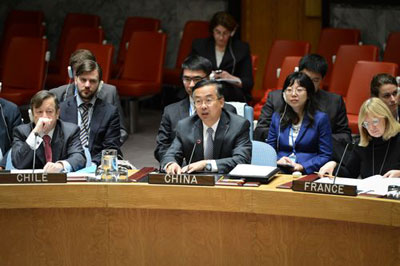| Statement by Ambassador Wang Min, Deputy Permanent Representative of China to the United Nations, at the Security Council Open Debate on Security Council Working Methods |
| 2014-10-23 05:30 |
|
Photo by Niu Xiaolei / Xinhua News Agency Madam President, The Chinese delegation thanks Argentina for its initiative of holding today’s open debate, and for its outstanding work as Chair of the Working Group on Documentation and Other Procedural Matters. In accordance with the Charter of the United Nations, the Council should elaborate its own rules of procedure. In recent years, while meeting all its other responsibilities, the Council has paid close attention to improving its working methods. These efforts have borne fruit. The number of open meetings convened by the Council has risen every year and the Council presidencies have persisted in briefing non-Council Members on a monthly basis, thereby enhancing the transparency of its work. Through various flexible means such as informal interactive dialogues, the Council has attached importance to improving its exchanges and interaction with the Member States and regional and subregional organizations. Since the beginning of this year, the Council has adopted four notes of the President on improving its working methods. These targeted measures have strengthened the mechanism-building process within the Council, contributing to its more pragmatic and efficient work, and helping the Council to better fulfil its Charter responsibilities. The current international security situation is highly complex. The continual outbreak of regional conflicts and local wars, coupled with the interlinked threats and challenges to security posed by terrorism, have made the responsibilities and mission of the Security Council even more arduous. The wider United Nations membership also has high expectations of the Council. China supports the ongoing improvement of the working methods of the Council so that it can conduct its work more fairly, efficiently and transparently, better meet the expectations of the international community, and play a greater role in the maintenance of international peace and security. I would now like to focus on the following points. First, the Council should adhere to the purposes and principles of the Charter of the United Nations as its guide in promoting the peaceful settlement of disputes. The Council should make use of the prevention, good offices and mediation tools entrusted to it by the Charter in an integrated manner in order to actively facilitate political dialogue and, through consultations and negotiations, promote reconciliation in order to achieve lasting peace and stability and safeguard international peace and security. That is also an important reflection of the Council’s role in the peaceful resolution of disputes under the principles of international law and its fulfilment of the responsibilities entrusted to it by the Charter. Secondly, the Council should focus on priorities and coordinate the division of labour. Under the Charter, the Council has the primary responsibility for the maintenance of international peace and security. Meanwhile, the Charter also includes provisions on the responsibilities of other United Nations organs. All United Nations bodies should fulfil their respective mandates, and, under the Charter, the Council should focus its energy and resources on addressing the most urgent issues that threaten international peace and security. On thematic issues, it should enhance its consultation and coordination with the General Assembly, the Economic and Social Council and other United Nations bodies in order to avoid duplication of effort. Thirdly, it should continue to pursue democratic consultations and political collective decision-making. Council members share the same responsibilities for maintaining international peace and security. The more complex and urgent the crises and challenges are, the greater the need for Council members to work together to be united in purpose and efforts and to cooperate fully in ways that reflect the principles of justice and democracy. All Council members should have ample time for studying the draft resolutions and presidential statements presented and, through patient consultations and negotiations, reach broach consensus and preserve the solidarity of the Council, rather than forcing texts through on which there are still major differences. Fourthly, there should be stepped-up communication and pooling of ideas. The Council should pay more attention to listening to the views of the general membership, in particular the countries on its agenda, and should step up communication and dialogue with the countries contributing troops to the peacekeeping operations and with the Secretariat. Questions related to Africa have always been a major focus of the Security Council. Therefore, the Council should attach importance to applying the expertise and experiences of the African Union and other regional organizations and their advantages in terms of history, geography and culture; strengthen its communication with them, and fully hear their opinions before making decisions; and support the important role played by regional organizations and the countries themselves, third-party States and organizations to play a more important role in the resolution of conflicts. I thank Ms. Prost, Ombudsperson of the Council’s Committee pursuant to resolutions 1267 (1999) and 1989 (2011) concerning Al-Qaida and associated individuals and entities, and Ms. Bensouda, Prosecutor of the International Criminal Court (ICC), for their briefings. China supports discussions on improving the sanctions mechanisms of the Council in order to ensure that the information related to listing applications is complete and accurate. The establishment of the post of Ombudsman for the Council’s Al-Qaida Sanctions Committee has its own special background and needs. In the light of the work of other Sanctions Committees, the Council may wish to study the question as to whether the mandate of the Ombudsperson should be extended to other Sanctions Committees. In handling relations between the Council and the ICC, China’s position is consistent. We believe that the ICC’s efforts to seek justice should take into account the urgent needs of maintaining regional peace and stability. The ICC should strictly abide by the principle of complementarity and support the Council’s efforts to fulfil its responsibilities under the Charter. Thank you, Madam President. |
| |||||||||||||
| |||||||||||||
